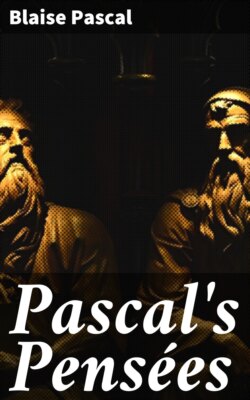Читать книгу Pascal's Pensées - Blaise Pascal - Страница 147
На сайте Литреса книга снята с продажи.
139
ОглавлениеDiversion.—When I have occasionally set myself to consider the different distractions of men, the pains and perils to which they expose themselves at court or in war, whence arise so many quarrels, passions, bold and often bad ventures, etc., I have discovered that all the unhappiness of men arises from one single fact, that they cannot stay quietly in their own chamber. A man who has enough to live on, if he knew how to stay with pleasure at home, would not leave it to go to sea or to besiege a town. A commission in the army would not be bought so dearly, but that it is found insufferable not to budge from the town; and men only seek conversation and entering games, because they cannot remain with pleasure at home.
But on further consideration, when, after finding the cause of all our ills, I have sought to discover the reason of it, I have found that there is one very real reason, namely, the natural poverty of our feeble and mortal condition, so miserable that nothing can comfort us when we think of it closely.
Whatever condition we picture to ourselves, if we muster all the good things which it is possible to possess, royalty is the finest position in the world. Yet, when we imagine a king attended with every pleasure he can feel, if he be without diversion, and be left to consider and reflect on what he is, this feeble happiness will not sustain him; he will necessarily fall into forebodings of dangers, of revolutions which may happen, and, finally, of death and inevitable disease; so that if he be without what is called diversion, he is unhappy, and more unhappy than the least of his subjects who plays and diverts himself.
Hence it comes that play and the society of women, war, and high posts, are so sought after. Not that there is in fact any happiness in them, or that men imagine true bliss to consist in money won at play, or in the hare which they hunt; we would not take these as a gift. We do not seek that easy and peaceful lot which permits us to think of our unhappy condition, nor the dangers of war, nor the labour of office, but the bustle which averts these thoughts of ours, and amuses us.
Reasons why we like the chase better than the quarry.
Hence it comes that men so much love noise and stir; hence it comes that the prison is so horrible a punishment; hence it comes that the pleasure of solitude is a thing incomprehensible. And it is in fact the greatest source of happiness in the condition of kings, that men try incessantly to divert them, and to procure for them all kinds of pleasures.
The king is surrounded by persons whose only thought is to divert the king, and to prevent his thinking of self. For he is unhappy, king though he be, if he think of himself.
This is all that men have been able to discover to make themselves happy. And those who philosophise on the matter, and who think men unreasonable for spending a whole day in chasing a hare which they would not have bought, scarce know our nature. The hare in itself would not screen us from the sight of death and calamities; but the chase which turns away our attention from these, does screen us.
The advice given to Pyrrhus to take the rest which he was about to seek with so much labour, was full of difficulties.[69]
[To bid a man live quietly is to bid him live happily. It is to advise him to be in a state perfectly happy, in which he can think at leisure without finding therein a cause of distress. This is to misunderstand nature.
As men who naturally understand their own condition avoid nothing so much as rest, so there is nothing they leave undone in seeking turmoil. Not that they have an instinctive knowledge of true happiness …
So we are wrong in blaming them. Their error does not lie in seeking excitement, if they seek it only as a diversion; the evil is that they seek it as if the possession of the objects of their quest would make them really happy. In this respect it is right to call their quest a vain one. Hence in all this both the censurers and the censured do not understand man's true nature.]
